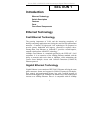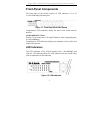
D-Link DGS-1016D/DGS-1024D Unmanaged Gigabit Ethernet Switch
2
and 100Mbps Ethernet environments, Gigabit Ethernet provides a
straightforward upgrade without wasting a company’s existing investment
in hardware, software, and trained personnel.
The increased speed and extra bandwidth offered by Gigabit Ethernet are
essential to coping with the network bottlenecks that frequently develop as
computers and their busses get faster and more users use applications that
generate more traffic. Upgrading key components, such as your backbone
and servers to Gigabit Ethernet can greatly improve network response
times as well as significantly speed up the traffic between your sub-
networks.
Gigabit Ethernet enables fast optical fiber connections to support video
conferencing, complex imaging, and similar data-intensive applications.
Likewise, since data transfers occur 10 times faster than Fast Ethernet,
servers outfitted with Gigabit Ethernet NICs are able to perform 10 times
the number of operations in the same amount of time.
In addition, the phenomenal bandwidth delivered by Gigabit Ethernet is
the most cost-effective method to take advantage of today and tomorrow’s
rapidly improving switching and routing internetworking technologies.
Switching Technology
Another key development pushing the limits of Ethernet technology is in
the field of switching technology. A switch bridges Ethernet packets at the
MAC address level of the Ethernet protocol transmitting among connected
Ethernet or fast Ethernet LAN segments.
Switching is a cost-effective way of increasing the total network capacity
available to users on a local area network. A switch increases capacity and
decreases network loading by making it possible for a local area network
to be divided into different segments that do not compete with each other
for network transmission capacity, decreasing the load on each segment.
The switch acts as a high-speed selective bridge between the individual
segments. Traffic that needs to go from one segment to another (from one
port to another) is automatically forwarded by the switch, without
interfering with any other segments (ports). This allows the total network
capacity to be multiplied, while still maintaining the same network cabling
and adapter cards.


















